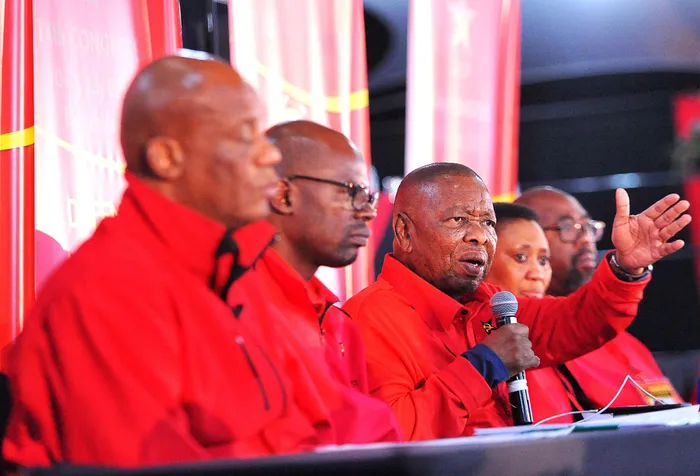Is the SACP still relevant in South Africa today?

The SACP leadership, with general secretary Blade Nzimande, centre, flanked by (from left) second deputy general secretary Chris Matlhako, first deputy general secretary Solly Mapaila, treasurer Joyce Moloi-Moropa, and deputy chairperson Thulas Nxesi. File picture: Itumeleng English/African News Agency (ANA)
SACP general secretary, Blade Nzimande. Picture: Nokuthula Mbatha / African News Agency (ANA)
By Professor B. Dikela Majuqwana
In 1995, the South African Communist Party (SACP) came up with a new slogan: “Socialism is the Future – Build It Now”.
This was when the world was still in amazement after the collapse of the Soviet Union. Some 27 years later, in July 2022, the Party will host its 15th National Conference in Ekurhuleni to review progress and chart a way forward for the coming decades. A question many party members and supporters may be asking themselves is whether the Party and its slogans are of any relevance in South Africa today.
Party documents due for discussion at the forthcoming conference in July insist there is no better time for communists than now. In its draft programme for discussion, the Party presents its perspective on socialism as follows:
“Socialism is a transitional social system between capitalism (and other systems based on class exploitation and oppression) and a fully classless, communist society. A socialist society has a mixed economy but one in which the socialised component of the economy is dominant and hegemonic. The socialised economy is that part of the economy premised on meeting social needs and not private profits. Socialising the economy includes the direct empowerment of workers on the shop floor, by progressively increasing their control over....”.
What has the SACP achieved during the past two and half decades to justify continued public faith in its programmes?
The Freedom Charter has until now provided a common platform for the ANC and the SACP to justify their alliance in pursuit of what they term the National Democratic Revolution (NDR).
The Freedom Charter offers them a transition from “colonialism of a special type” and apartheid oppression to a socialist society. However, the Party bemoans the failure of the ANC to live up to expectations since 1994, citing ‘state capture’ and rampant corruption as setbacks for the Freedom Charter and the socialist agenda.
Up to now, the SACP has upheld an alliance with the ANC to the extent that members have served as cabinet members and parliamentarians. If the party now bemoans runaway corruption and ‘state capture’, how can it escape direct responsibility for such failures? Why should corruption and ‘state capture’ not continue in future with the active participation of SACP members? And, were the party to walk away from the ANC alliance, why should members suddenly become angelic and shun corrupt behaviour?

In other words, delegates at the forthcoming conference in July must dig deeper to establish the extent to which communists in South Africa have in so many ways disregarded their own slogans to support politicians they have discovered are corrupt and ‘captured’.
‘State capture’ refers to the relationship between former President Jacob Zuma and his Gupta family friends as reported by the Zondo Commission. When Zuma rose to become state president, he did so with vigorous support from the SACP and its allies. Right now, the ANC and its government appear to be plunging into yet another potential scandal involving President Cyril Ramaphosa. He too rose to the Presidency with support from the SACP and its allies.
According to recent media reports, it is alleged President Ramaphosa withheld information about a serious crime at his Phala Phala farm in 2020 where his millions of US dollars were stolen. It is reported that upon recovery of the money, thieves were ‘bribed’ not to reveal the incident. A keen observer cannot be blamed for thinking we have either poor political judgement or conniving by SACP leaders who have become skilled at playing ANC leaders in contests against each other.
It is also important to ask which ANC policies have up to now demonstrably favoured either the Freedom Charter or socialism if we are to justify any future alliance based on the slogan “Socialism is the future -build it now”. By definition, such policies must be shown to be irreversible. If anything, the ANC has treated the SACP and its outlook with total disregard and ridicule. Former President Thabo Mbeki never hid his hatred for the SACP during his term.
While Jacob Zuma began his term with some positive gestures and promoted many SACP members to his cabinet, he ended up with Gupta family friends and their state capture according to the party. Lately, Ramaphosa’s cabinet has largely retained the SACP members promoted by Zuma but is pursuing a policy agenda that can hardly be praised for favouring the Freedom Charter or socialism. From this emerges a picture of a communist party driven more by political careerism than by either pursuit of the Freedom Charter or socialism. Moreover, such communism presents itself as a useful tool for the oppressing classes who want to fool the people to defeat the Freedom Charter and socialism.
If the SACP is to emerge from its July conference better prepared to lead society, it must show it is ready to devise new programmes for alliances that go beyond trailing the ANC.
The party must be ready to lead broader political fronts with an agenda to mobilise petty proprietors and small independent farmers alongside workers, not only those in the Congress of South African Trade Unions. To succeed, the SACP must be willing to raise a new generation of communists, who are better suited to lead struggles in a technologically intense 21st century under conditions of global climate uncertainty and pandemic diseases.
Majuqwana is the Head of Engineering at the University of Zululand. He writes in his personal capacity.
This article is original to The African. To republish, see terms and conditions.
Related Topics: